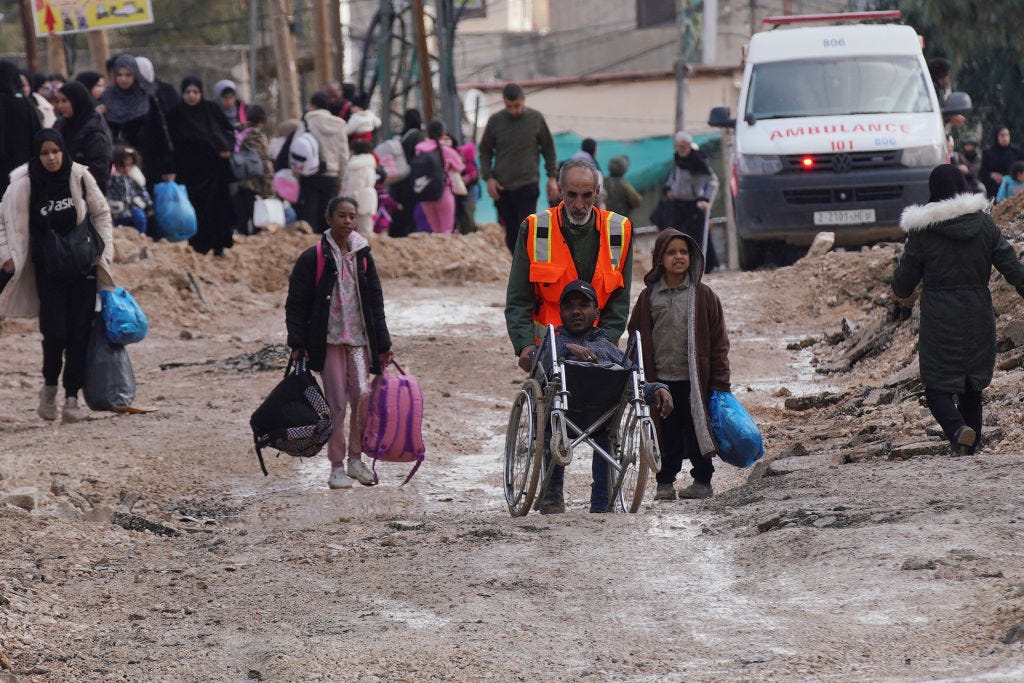From the Palestinian Authority’s Siege to Israel’s Assault, Jenin Residents Face Another Wave of Violence
On the heels of a 40-day PA operation, Israeli forces raided the West Bank city of Jenin this week, forcing hundreds to flee and renewing fears that Israel plans to do there what it's done in Gaza.

JENIN, occupied West Bank – The scenes, in many ways, look like they could be from Gaza: Palestinians, carrying young children, holding bags, pulling suitcases, and pushing people in wheelchairs, walking under the watchful eyes of Israeli soldiers, guns in tow, against the backdrop of destroyed roads, bombed buildings, and bullet-ridden cars.
But this isn’t Gaza. It’s Jenin in the occupied West Bank, where Israel escalated its attacks just days after its “ceasefire” with Hamas took effect in Gaza. Over the last week, Israeli forces have stormed Palestinian cities across the West Bank, erected scores of new checkpoints, and conducted mass arrests. Jenin, a stronghold of armed Palestinian resistance, has been one of the main targets.
Since Tuesday, Israel has laid siege to the city’s refugee camp and surrounding areas, conducted drone strikes, and raided hospitals in an operation it says is necessary to “defeat terrorism.” At least 12 Palestinians have been killed and 40 others wounded. Hundreds of Palestinians who live in Jenin’s refugee camp, home to 24,000, have fled, with many saying Israel ordered them to evacuate – something Israel has denied.
On Friday, local media reported that Israeli forces continued to bulldoze and set fire to homes in Jenin.

The Israeli raid, to many Palestinians, renews fears that Israel plans to do what it did in Gaza to the West Bank. But Jenin, in particular, highlights an unprecedented wave of violence brought on by Palestinian security forces and, now, the Israeli military.
The Israeli assault, called “Iron Wall,” comes on the heels of a rare 40-day operation by the Palestinian Authority against the Jenin Brigades, an umbrella armed group made up of members of Hamas, Palestinian Islamic Jihad (PIJ), and the Al-Aqsa Martyrs’ Brigades. The PA, which over the weekend reached a truce with the armed group, only withdrew from the perimeter of the city hours before Israel invaded, confirming to many residents that the PA has only been doing Israel’s bidding. Scenes from the first day of the Israel attack stood in parallel to that of the PA invasion, with almost identical armed personnel carriers shuttling soldiers in and out of the camp.
While the PA claimed it withdrew to “avoid a full-on confrontation with the occupation” – an apparent attempt to distance itself from the Israeli operation – its security forces have since stormed a Jenin hospital in what some see as a public display of collusion with Israel. The Israeli operation also highlights for some the weakness of the PA and the failure of its own operation.
As one resident told me: “Israel came in to clean up.”
Operation “Protect the Homeland”
Jenin has for decades been subjected to deadly Israeli raids. It was here that an Israeli soldier shot dead Al Jazeera journalist Shireen Abu Akleh during a raid in 2022. And while tensions between the Palestinian Authority and armed groups are nothing new, the PA had largely lost control of armed group strongholds, including Jenin’s refugee camp.
But since the Oct. 7 Hamas attacks and Israel’s ensuing genocide in Gaza, the Palestinian Authority has stepped up its own operations as Israel leaned on PA security forces to help quell growing unrest across the West Bank. This culminated in the Jenin siege, dubbed by the PA as “Protect the Homeland.”
I was in the city in late December last year as the PA operation got underway and witnessed first-hand the scenes that residents say have come to mirror Israeli raids.


